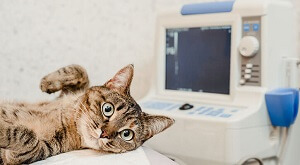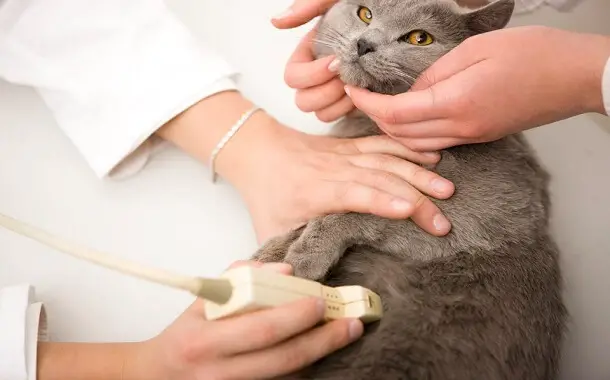How Much Does a Cat Echocardiogram Cost?
There are several causes of cat heart murmurs but among them, the most common reason for feline cardiac disease is cardiomyopathy. This is a disease known to trigger the heart to enlarge, affecting the heart muscle slowly, which will ultimately make it less proficient at pumping blood due to all of the damage it suffers.
The usual physical exam will involve a vet listening to the heart of the cat using an amplified stethoscope. This will help them figure out what is the root cause of the murmur and ultimately give the best treatment for each specific case.
An echocardiogram, also known as the cardiac ultrasound, or “echo” for short, will be needed when the veterinarian tries to rule out progressive heart disease. This test is done to determine the heart chamber sizes and quantify the heart’s wall thickness. It is also used as a way of checking motion to see the heart’s capacity to pump out blood. When detected in time, most cardiac problems in cats are treatable.
How Much Does a Cat Echocardiogram Cost?
On average, a cat echocardiogram will cost between $130 and $600. This will usually not include an office visit fee or additional X-rays when needed. When you count all of the fees you will be faced with, expect a total cost of about $400 to $750. This cost range will depend on factors like the extent of the procedure, the veterinarian doing it, and whether it is done in an animal hospital or a veterinary office setting.
According to TheCatPractice, The echocardiogram would cost about $350, while the chest x-ray could cost only about $250.
AnimalERC.com on the other hand, states that you will likely spend $571 in total on your cat’s echocardiogram screening and evaluation of results as long as you’re not facing unexpected complications.
A discussion on Reddit revealed that there is a big disparity in prices depending on the location of the vet’s office. A thread a few years old had members talking about prices between $500 and $700 at popular vets in big cities.
What are the extra costs?
Most of the time, a regular veterinarian won’t have the needed expertise to read and understand high-tech echocardiogram interpretation. This means that it will be vital that you get in touch with a cardiologist to get a proper diagnosis. Once the root cause is diagnosed, most vets will have no problems managing the heart case and figuring out the best course of treatment.
You might also like our articles about the cost of a cat urinalysis, feline leukemia test, or cat blood work.
Most people have to consider traveling several hours for these types of specialty services. Using a clinic that has an in-house veterinary cardiologist is considered a luxury and the cost will reflect this.
Before suggesting the ultrasound, most veterinarians will first want to get an X-ray procedure done. And even the X-ray procedure is done only after completing a basic physical examination. All of these tests will come at an additional fee. X-rays, for example, cost at least $200.
Echocardiogram ultrasound for a cat overview
 The cost estimates provided above should include the cardiac ultrasound procedure, the results you get, as well as their analysis and a final diagnosis made by a vet.
The cost estimates provided above should include the cardiac ultrasound procedure, the results you get, as well as their analysis and a final diagnosis made by a vet.
This procedure enables the expert to examine the internal organs of the cat. It is considered a non-invasive test and will usually be used to check the pet’s organs, including the heart, reproductive organs, and so on. The echocardiogram is used as an additional procedure on top of the X-ray when this spots something but the vet needs a more in-depth look to figure out exactly what it is. Depending on the length of the chest hair, it might need to be clipped for the procedure to be successful.
Most heart problems will have vets recommend X-rays, ultrasounds, and echocardiograms. X-rays are usually used to see the position, size, and shape of the cat’s heart, while ultrasounds are more for the vet to see inside the heart organ.
The echocardiogram doesn’t give out information on the lungs, but it will still be necessary if previous tests like the x-0rays and ultrasound show suspicious information of congenital or developed heart disease.
This procedure is almost always painless for cats, so anesthesia or sedation of any kind isn’t a must in most cases.
It will take somewhere between 30 and 60 minutes, with additional time needed when heart valves will also have to be measured.
How can I save money?
According to the American College of Veterinary Internal Medicine, a great way to save money is by calling several local veterinarians and seeing what each of them charges. Most of them are able to give you a ballpark estimate during the initial discussion on the phone.
You can ask for a pre-test consultation. This is to ensure that an echo is needed for your cat’s specific case. The echocardiogram is considered a last resort for most vets, as other tests that are cheaper and faster provide the needed information in most cases.
You should also give a call to the local Humane Society and see if they have different rates for this procedure. This is because the Humane Society and other local shelters will often offer lower rates for people who can’t afford certain tests.
Getting a pet insurance policy is also a good idea, as most policies are very affordable and can help you save thousands of dollars over the course of a cat’s life.



Leave a Reply
Want to join the discussion?Feel free to contribute!